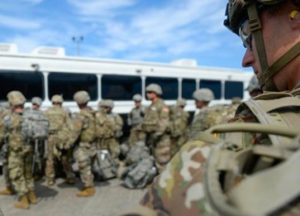While the U.S. is pulling troops out of Iraq and Afghanistan, Massachusetts is welcoming home an influx of veterans. And that means a renewed effort to connect them with educational and social programs. A closer look at the unique financial issues veterans face.
September 4, 2014 – By Anne Mostue

Suzanne Katz works for the Newton-based nonprofit American Consumer Credit Counseling. She’s set up a table, alongside employers, colleges and VA hospital workers. But she’s talking financial literacy.
“A booklet on identity theft and a full financial workbook. I also brought my computer to pull credit reports…”
Katz hands one visitor a pamphlet that reads, Protect your Money from Poachers.
“Both senior citizens and military personnel are still the highest victims of identity theft. Because their social security numbers are out there more than anybody else’s. After 9/11 the Registry of Motor Vehicles changed our numbers. They are still identified by their Social Security numbers for the VA hospitals and many other military things.”
And Katz works with veterans before and after deployment to get them to save their tax-free earnings while overseas.
“Off the bases you’ll see lines of Harley dealerships, payday loan companies, check cashers, trying to hook them in, either to make purchases with what they make on deployment or getting them to make some crazy decision.”
Most visitors have private conversations with Katz. But one veteran, Ron Howard of Beverly, stops by just to say hi.
“She helped me out with housing and she helped me get into a class on where my money’s going.”
While most of the veterans at this fair tend to be in their mid 20s or early 30s, Howard is slightly older. He says he attends the events for information, but also for camaraderie.
“I went to Stand Down yesterday in Dorchester. I like to see what’s going on, really. I know they’re helping the veterans out like crazy now.”
And it’s true. Massachusetts ranks first in the nation for spending on veterans’ benefits. David Hencke, a veteran himself, works as an outreach coordinator for the VA. He says it’s still tough to connect veterans to programs and services.
“We have wonderful expos and fairs. Now that we’ve pulled out of Afghanistan and Iraq and we’re drawing down from those places, now those folks are back among us in the community. It’s stressful particularly for Guardsmen and Reservists. And the question is how do we get to them?”
Hencke says financial literacy programs like Katz’s help with what he calls PTSG.
“Post-traumatic growth. And in post-traumatic growth you actually make this network and you see somebody, hey you were a marine, you were a soldier. It’s a wonderful thing to have been in the service and then to be part of this network. There’s more out there than you can imagine.”
And for those veterans chatting with Katz, it’s often a surprise that her services are free. She says she wouldn’t have it any other way.
“A lot of people think that when somebody comes home from service they just jump back into work. A lot of them come back not having jobs because of the economy.”
An economy that will hopefully continue to improve as troops come home.
